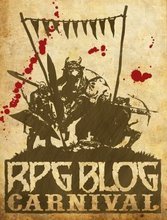*Ball of Abysmal Flame
One of my all-time favorite RPGs is Ars Magica. I love the fact that it doesn’t try to impose game balance limitations on mages. I also love the troupe-style play where everyone gets to play a magus/maga and something else. As a Storyguide, I love the fact that the group as a whole works together to create at least some of the NPCs (grogs).
But something else I hadn’t expected when I started playing Ars was how much it would improve my D&D characters.
I’d never really played many magic-users in D&D 1st ed., mostly because (and my current DM and fellow players are going to laugh at this) I couldn’t figure out how to use spells effectively. Seriously — beyond Magic Missle, Lightening Strike, and Fireball, I’d look at my spell list and my brain turned to jelly. Nothing MUs were able to do seemed to compare to the ability to pick locks, do massive amounts of damage with a two-handed sword, or lay hands to heal people.
Enter Ars Magica.
Ars has something of steep learning curve. Its magic system is definitely very different from D&D. It threw me for quite awhile, but after several game sessions of watching my fellow magi at their best, something clicked. I started to be able to see different uses for my Arts and Spells. I came to love Ars’ Sponteneous Magic. To this day, I rarely use formulaic spells.
Then I came back to D&D. I decided I wanted to give magic-users a try again, hoping my experience in Ars would help me. It did. I had a little difficultly refocusing my mind on formulaic spells, rather than spontaneous casting, which led me to prefer the sorcerer over the wizard class. Yes, I was still constricted to a spell list, but at least I could use any spell I knew any number of times. Truthfully, though, it wasn’t so much a number of spells or the amount of times I could cast one that made the decision for me: it’s the idea of the sorcerer as a natural caster that appeals to me.
I admit, when I create a new magic-user in D&D now, I think of them in Ars Magica terms first, then translate that into D&D as closely as I possibly can. For example, I’m currently play two different sorcerers in two different games. I’ll break them down into Ars concepts, then show the translation to D&D
Galen Gerhardt: In Ars Magica terms, Galen would be a member of House Jerbiton. He’s a court sorcerer and bard (and spy, but that’s neither here nor there…) of a powerful prince, with a Gentle Gift and an Animal Affinity. His specialty is Rego Mentum magic, though he’s got a strong amount of Rego Animal in there, too. In D&D terms, that translates into a human sorcerer heavy on the charm magics and people skills. His favorite spells: Eagle’s Splendor, Charm Monster, Charm Person, and Touch of Idiocy.
Feynan Starshadow: In Ars Magica terms, Feynan would be a rather stereotypical Flambeau, except his magic focuses on electricity rather than fire. Still, he’s heavy on the Creo Ignum magics and has faery blood. In D&D, he’s a half-elven sorcerer of the blaster type. His favorite spells: Lightening Bolt, Electric Loop and Lesser Orb of Electricity (from the Spell Compendium), frequently combined with Web.
By thinking of my magic-user in Ars terms, I’ve managed to create two completely different characters. I haven’t yet tried it with other game systems, but I can image it would work for them, too. And I’m sure this thinking would work for characters other than magic-users. How about you? What other systems have you drawn on to create D&D characters?
Oh — and for those of you wondering:
ArM Code 1.5 4- Ca+ R H++ L- G+++ Y1995 T– SG P++ HoH Cr+ Tr+ Ty++ J+ FZ C+ 🙂 Cd






